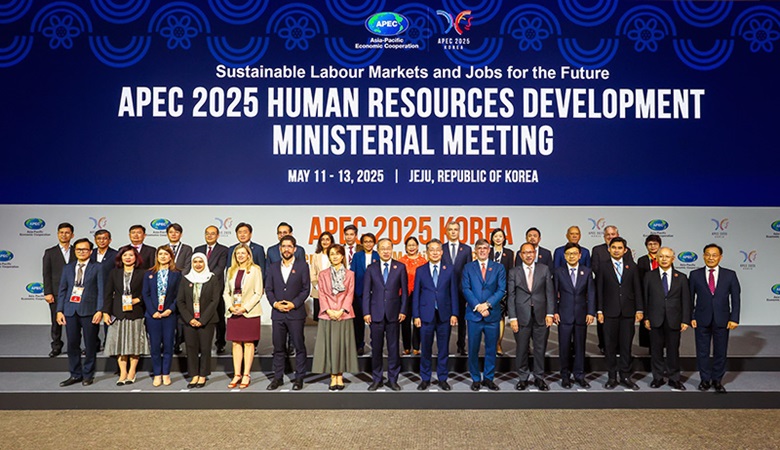Joint Statement of the 7th Human Resources Development Ministerial Meeting

Joint Statement of the 7th Human Resources Development Ministerial Meeting
Sustainable Labour Markets and Jobs for the Future
We, the Asia-Pacific Economic Cooperation (APEC) Ministers responsible for Human
Resources Development, convened in Jeju Island, Republic of Korea, on 11-13 May 2025 for the APEC 7th Human Resources Development Ministerial Meeting (HRDMM).
Under the theme of the HRDMM, “Sustainable Labour Markets and Jobs for the Future” and in alignment with the APEC 2025 theme, “Building a Sustainable Tomorrow: Connect, Innovate, and Prosper,” we aim to promote a flexible, inclusive, and resilient labour market to further our collective commitment to labour market reforms that support today's workforce. We support forward-looking labour market policies that promote access to high-quality and full employment opportunities for all.
Our discussions centred on two pivotal themes: First, flexible and vibrant labour markets. Second, responding to future jobs through dynamic and active labour market policies.
Flexible and Vibrant Labour Markets
The rapid emergence of new technologies, notably artificial intelligence (AI), is reshaping labour markets. It is critical that labour market systems respond to structural changes, in order to mitigate potential negative impacts on workers such as job losses and polarization.Furthermore, in some economies there is also an increasing number of workers in new forms of employment with no or limited access to social and employment protection. To turn these challenges into opportunities, it is essential to implement human-centred policies that foster flexible and dynamic labour markets, strengthen an effective implementation of laws which provide robust protections for all workers including those far from achieving access to social and employment protection.
Therefore, we are committed to:
1. promoting a flexible working environment that enables the creation of quality jobs for workers with adequate social and employment protections.
2. exploring best practices for reforms that support adjustments in wages, working hours, and other employment terms to maintain labour market adaptability and improve the quality of employment.
3. tackling labour market polarization and enhancing efforts to promote fair employment practices. We aim to address structural imbalances and discrimination that hinder economic participation, and encourage the transition to the formal economy.
4. working towards high-quality and sustainable social safety nets, as appropriate, to extend coverage to all workers.
5. enhancing occupational safety and health policies, practices and standards across APEC member economies by leveraging new technologies, supporting efforts to address workplace violence and harassment and sharing best practices.
6. facilitating sharing of knowledge and best practices on labour market policies among APEC member economies to mitigate technological divides.
Responding to Future Jobs through Active Labour Market Policies
The landscape of future jobs is evolving due to digitalization, artificial intelligence, and automation. At the same time, demographic shifts in the APEC region — marked by declining birth rates and an ageing population — are leading to a shrinking workforce. To proactively address these evolving labour market challenges, it is important to strengthen active labour market policies, modernize human resources development, and foster quality job creation while recognizing the indispensable role that the private sector has in creating and sustaining these jobs.
Therefore, we are determined to:
1. align the vocational education and training system with evolving industry and employer demands through accessible and customized training, reskilling, upskilling, and lifelong learning programs, and promoting digital accessibility.
2. provide efficient, accessible, technology-driven and targeted employment services to promote high-quality and full employment and facilitate labour market access.
3. support young people transitioning from education to quality and sustained employment by facilitating early labour market entry and employability, and enhancing pathways from vocational training to employment.
4. enhance policy support to increase women’s participation at all levels in the labour market and promote accessible childcare and other care services. We also endeavour to promote work-life balance and ensure that parents are not disadvantaged in the labour market . Additionally, we seek to provide support to prevent and manage workplace violence and harassment.
5. empower older workers to leverage their professional expertise and experience, and be retained in the labour market, as well as have the ability to transition into new roles and re-enter the labour market through targeted reskilling programs, and flexible working arrangements, and other incentives aimed at promoting their re-employment.
6. foster collaboration among APEC member economies including through the sharing of best practices and knowledge on vocational training to enhance employment opportunities and mobility for workers within their respective economies.
7. promote capacity building for persons with disabilities through skill development, improved access to career services, and quality employment opportunities.
8. prepare workforces for evolving working condition due to various disruptive environmental factors by promoting skill development for sustainable industries to mitigate impacts on jobs and workers.
We reaffirm our commitment to the Putrajaya Vision 2040, including through the implementation of the Aotearoa Plan of Action. We note the Lima Roadmap to promote the Transition to the Formal and Global Economies (2025-2040). We note the contribution and achievement that the Human Resource Development Working Group (HRDWG) and its Networks have made in promoting human resources development in APEC member economies, the HRDWG Detroit Non-Binding Principles and Recommendations (2023) and the Arequipa Goals (2024).
We strive to create a prosperous economic future for workers and businesses, and urge continued cooperation among APEC member economies to develop a resilient, inclusive, and future-ready skilled workforce.
We express our deep gratitude to the Republic of Korea for the success of the meeting, and look forward to initiatives from each economy that will support this joint statement. We look forward to future HRDMMs.

